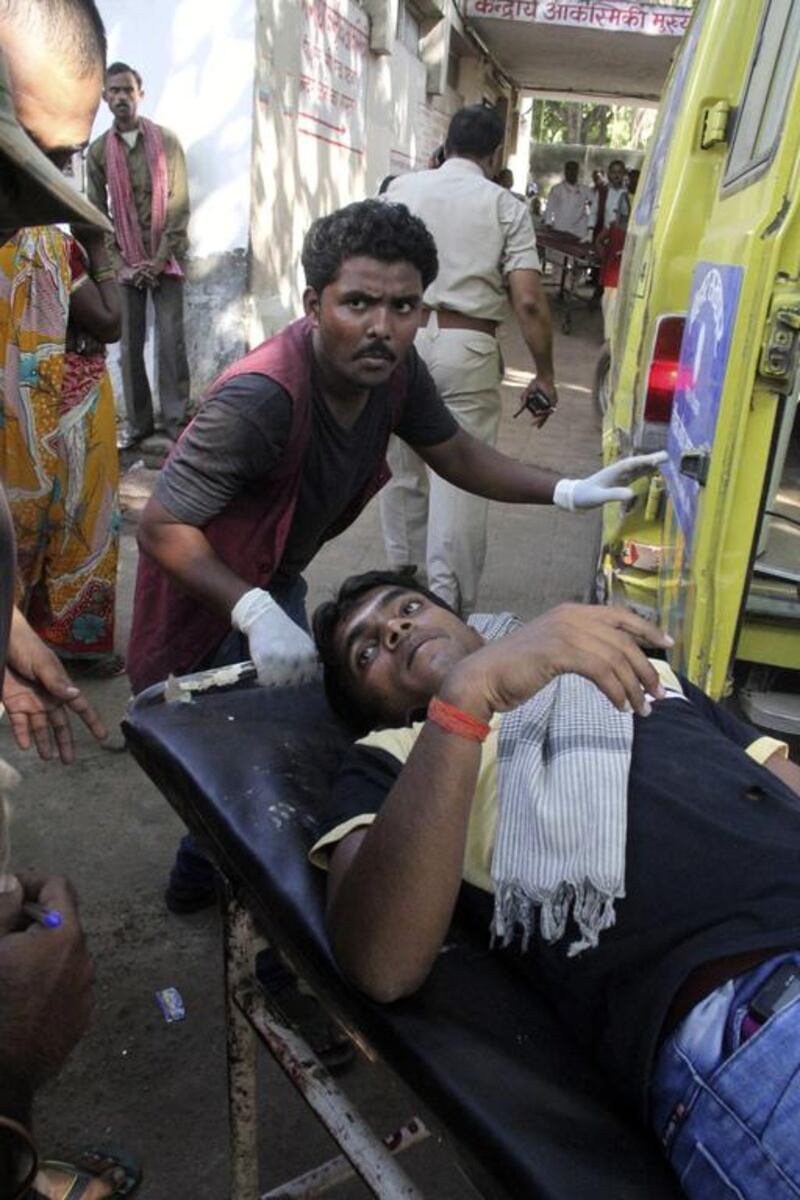PATNA // A series of crude bombs killed five people in the capital of Bihar state on Sunday, shortly before a campaign rally by the opposition party leader Narendra Modi.
Seven small bombs exploded near the venue in Patna, where tens of thousands were gathering to hear Mr Modi, a popular but divisive leader of the Hindu nationalist Bharatiya Janata Party (BJP), launch the opposition’s campaign for elections in the eastern state.
The first explosion occurred in a public toilet at a railway station, before more blasts near and just outside the Gandhi Maidan ground where the rally was held.
“Five people were killed and over 60 people injured in the serial blasts,” said S K Bhardwaj, the additional director general of police in Patna.
Two people were arrested, another police officer said, while the national government deployed anti-terrorism forces to Bihar to investigate.
Television footage showed people running from an explosion, with smoke rising above them.
“The condition of nearly half a dozen injured is critical,” said an official from the Patna Medical College and Hospital, adding that some people were injured in stampedes after the blasts.
Mr Modi, who has been campaigning to topple the ruling Congress party since he was named last month as the BJP’s prime ministerial candidate for the national elections, later took to the stage and urged Hindus and Muslims to unite to overcome poverty in Bihar, a key battleground in the general election due next May.
“If we want to take Bihar forward we need to unite people of all religions, caste and creed together. We want to unite people, not divide them,” he told cheering supporters.
“Our opponents are fooling people. That’s why I want to ask my poor Muslim and Hindu brothers, do you want to fight against each other or against poverty?”
Mr Modi ignored the blasts during his speech and instead focused on criticising the government of Prime Minister Manmohan Singh for the country’s high inflation. He also accused Bihar’s highest elected leader, chief minister Nitish Kumar, of betraying the BJP after using its support to win his seat in the state.
Mr Modi’s plans to visit Bihar have been controversial since Mr Kumar severed ties with the BJP six months ago to protest Mr Modi’s candidacy. Mr Kumar has questioned Mr Modi’s secular credentials and suggested that he could exacerbate communal tensions between Hindus and Muslims in India.
The chief minister of the economically successful western state of Gujarat, Mr Modi is popular with the corporate world. Many hope he can revive Asia’s third-largest economy if elected next year.
But he remains a divisive figure, tarred by religious riots in Gujarat in 2002 in which as many as 2,000 people were killed, mainly Muslims, according to rights groups.
Mr Modi was chief minister at the time and denied any wrongdoing, but one of his former ministers was jailed last year for orchestrating some of the violence.
Prime Minister Manmohan Singh condemned Sunday’s blasts, appealed for calm and “called for urgent steps to identify and take action against those responsible”.
The junior home minister, R P N Singh, said officers from the National Security Guard and National Investigation Agency had been deployed to Bihar.
Two more unexploded crude bombs were discovered at the railway station after a bomb disposal squad swept it, a police official told the Press Trust of India.
After the rally Mr Modi described the blasts as “deeply saddening and unfortunate”.
“Condolences with families of deceased & prayers with injured. I appeal for peace & calm,” he tweeted.
Mr Modi and his political rival Rahul Gandhi from the Congress party are holding a series of mass rallies across the country in a battle to win five key state elections later this year.
Those elections are seen as a crucial test of popularity, with both parties hoping to capitalise on any momentum from the results for next year’s general election.
* Agence France-Presse with additional reporting by Associated Press





